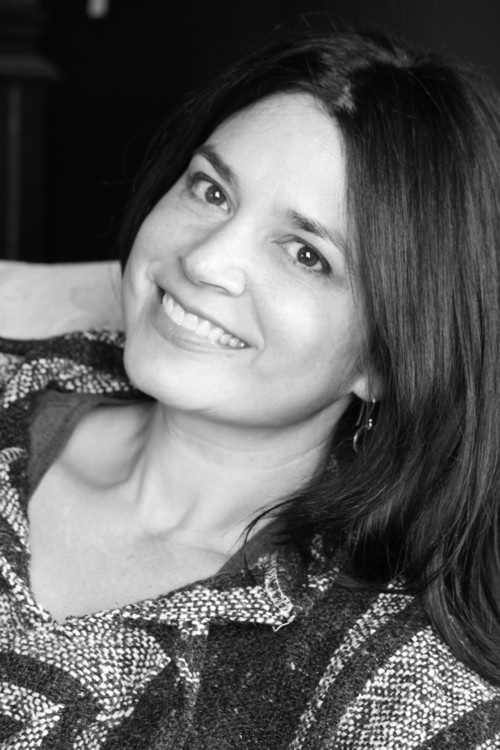
Most writers don’t aim to blur the lines between a crime thriller and a chick lit novel.
Joy Castro isn’t one of them.
“To write ‘Hell or High Water,’ I repurposed the conventions of classic noir and chick lit and put them into tension with each other to tell a story about sexual violence and environmental degradation,” said Castro, associate professor of English and ethnic studies. “I wanted to write a guilty beach read that would have political substance.”
Most recently, Las Comadres and Friends National Latino Book Club selected Castro’s forthcoming debut novel, “Hell or High Water,” as a 2012 Book of the Month.
“Latina and Latino readers all across the United States will be reading and talking about ‘Hell or High Water,’” Castro said. “That’s an amazing gift to an author. I couldn’t wish for anything better.”
“Hell or High Water,” sets up shop in post-Katrina New Orleans, where hundreds of registered sex offenders who went off the grid during the hurricane evacuation have never been found.
The novel’s protagonist, Nola Céspedes, is a young newspaper reporter who is assigned the sex offender story. As her research progresses, she becomes increasingly entangled with the criminal underworld of New Orleans.
“I wanted to dramatize the connection of writing to justice in a story about a young writer who longs to make a difference but then gets saddled with a story that scares her,” Castro said. “As I wrote, I realized that she was going to have to reconnect with her own difficult, problematic past as a child from a background of poverty before she could move forward and get the job done.”
For Castro, choosing New Orleans as the setting for her first novel wasn’t a difficult decision.
“It’s my husband’s hometown, and I fell in love with the city as I was falling in love with him,” Castro said. “Like many people who aren’t New Orleans natives, I’d romanticized its beauty and decadence. Getting to know the actual city personally is an education that has taken many years and continues to unfold.”
While “Hell or High Water” is a crime novel on the surface, it also aims to explore the complexities of a culturally rich place trying to move forward after enduring one of the country’s most devastating natural disasters.
“New Orleans has always been such a gorgeous, complicated, proud and vulnerable place,” Castro said. “I love it and wanted to honor the city and its people. And since the heart of my novel is about not just violence but the long, grueling aftermath of disaster, New Orleans after Katrina makes a resonant setting.”
Although “Hell or High Water” won’t be released until July, a sequel is already in the works.
“My agent got a two-book deal, so I knew there’d be a second book, though I wasn’t initially sure it would be a sequel,” Castro said. “But my editor at St. Martin’s loved the characters and wanted to see more of them – and I confess, I love them too and had played with some ‘What if?’ scenarios.”
In addition to penning novel number two, Castro is also busy preparing for the release of “Island of Bones,” a collection of creative nonfiction and personal essays that picks up where “The Truth Book” left off. The collection is forthcoming from the University of Nebraska Press.
Castro first rose to literary acclaim in 2005 with the publication of “The Truth Book,” a memoir that recounts her upbringing as an adopted child in a family of Jehovah’s Witnesses.
The success of “The Truth Book” helped Castro land a position with the university in 2007.
“I was delighted when she was hired and very enthusiastic about having her join our department,” said Susan Belasco, English department chair. “In addition to her growing reputation as a fine writer, Professor Castro brings impressive teaching credentials and rare administrative talent. I haven’t been disappointed.”
Just how does a professor with a joint appointment – meaning twice as many faculty meetings to attend, twice as many memos to read, twice as many reappointment files to evaluate and so forth – find time to be a working author?
“I write in bed in the mornings when I first wake up, before daily-brain takes over,” Castro said. “My imagination is still wild, not yet socialized by having to interact with people. When I finish writing for the day, I get up, get dressed and go to work like a normal professor.”
Other than the early-bird approach, Castro said she doesn’t have any special routines that get her creativity flowing.
“Maybe I should invent a ritual. If I do, it will definitely involve burning stuff,” Castro joked.
Castro’s wit, combined with her dedication and diligence to continued professional growth, has not gone unnoticed by colleagues.
“She is very funny and quick with email messages and comments that always make me laugh,” Belasco said. “I love that about her. (She also) has an admirable work schedule – it’s no wonder that she is such a productive writer and highly regarded teacher.”
This summer, Castro will take her teaching abilities across the Atlantic to Spain, where she’ll teach creative writing at the University of Seville.
“I’ve never been to Spain,” Castro said. “So I’m thrilled.”
Despite her heavy workload and echelon of responsibilities, Castro is a self-described introvert who needs little extravagance to be content.
“Aside from occasional travel, my concept of fun is going to the movies with my husband or talking about ideas over drinks at Marz with friends,” Castro said. “That’s pretty much all I need.”
— Mekita Rivas, University Communications